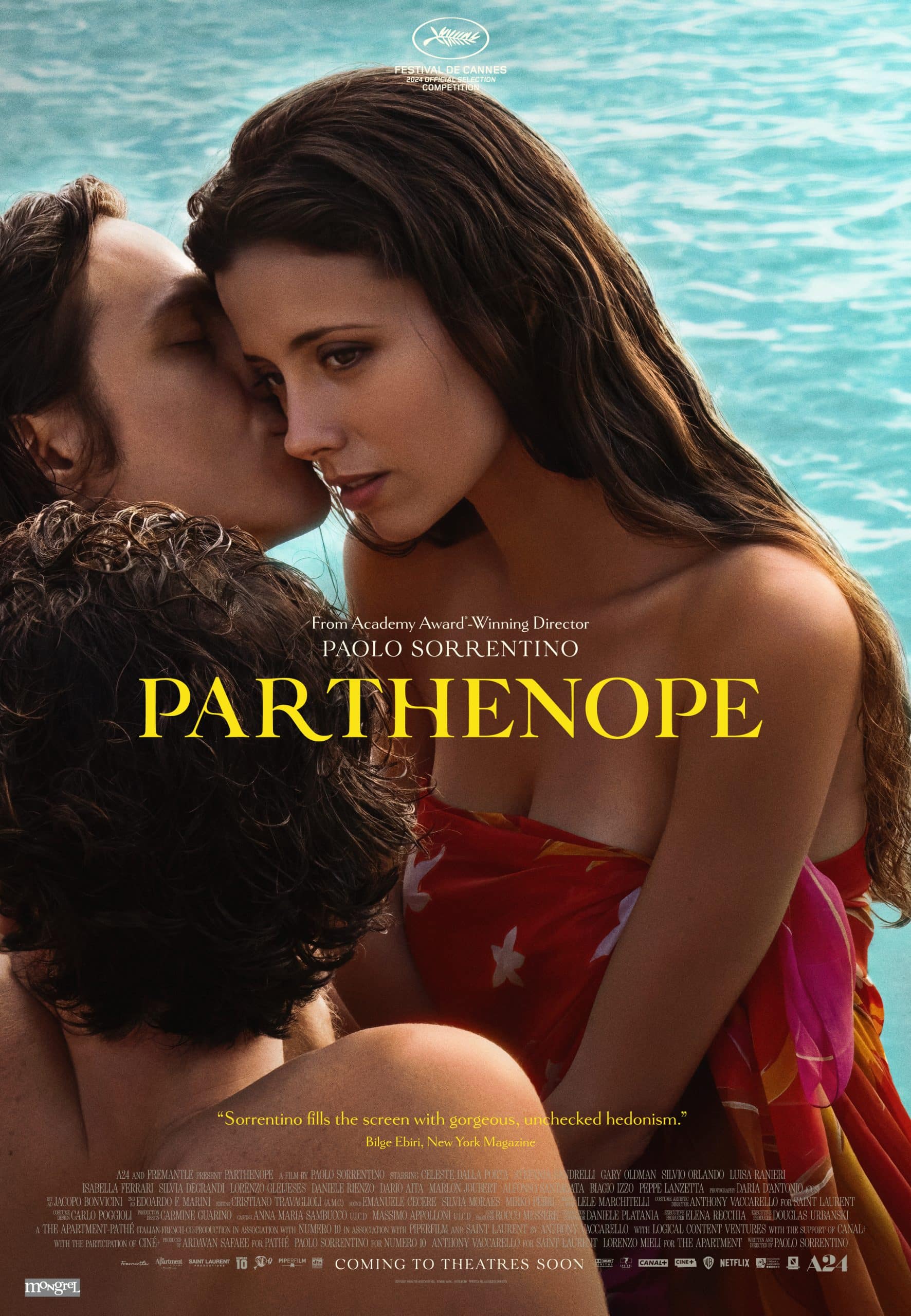
- Starring
- Celeste Dalla Porta, Stefania Sandrelli, Gary Oldman
- Writer
- Paolo Sorrentino
- Director
- Paolo Sorrentino
- Rating
- R (United States)
- Running Time
- 137 minutes
- Release Date (US)
- February 7th, 2025 (limited)
- Release Date (CAN)
- February 21st, 2025 (limited)
Overall Score
Rating Summary
Paolo Sorrentino has made a name for himself by telling wistful, dreamlike stories about beautiful people existing in beautiful places. His latest film, Parthenope, is not an exception to this trend. Following the life of a young woman from the late 1960s to the early 1980s, as she lives and loves around Naples, Sorrentino seems intent on investigating beauty, both what it delivers and what it costs. It’s a gorgeous piece of filmmaking, which unfortunately may be too shallow to carry the themes it is trying to grapple with.
The first shot of the title character, Parthenope (Dalla Porta), as she emerges from the sea beside her family’s villa and walks straight toward the camera. She’s in her early 20s, gorgeous, and has a local boy called Sandrino (Dario Aita) wholly captivated. She also holds sway over her brother Raimondo (Daniele Rienzo). She is deciding what to major in at school and settles on Anthropology under the tutelage of Devoto Marotta (Silvio Orlando). From there, the film follows her life as she drifts through it, at times a dedicated student, and at others living party to party with no fixed address, exploiting the weakness of the handsome older men who want to bed her.
Herein lies at least part of the problem with the film: while Dalla Porta is an effortless presence in the movie, Parthenope does not actually do all that much in the story other than drift through it, and like the siren of greek myth she’s named after, there are the ruins of heartbroken suitors all around her. This seems to stem from Sorrentino himself, and is exemplified by the way he and cinematographer Daria D’Antonio photograph her, which feels like it wants to understand a great, mysterious beauty but also very much wants simply to stare at that beauty. However, it is hard to blame them, whether it’s Dalla Porta or her young co-stars, or simply the timeless beauty of the Naples waterfront. This is not a film that anyone would call anything but a feast for the eyes; the issue is that it’s also not a feast for the soul.
That being said, there is plenty to like here. Sorrentino clearly loves Naples –and rightly so, it’s a gorgeous place. As much as the camera lingers on his young stars, it also rests easy on the the ideal version of the Italian coast that we all have in our minds, made entirely of stunning seaside villas, white boats with wood detailing, and beautiful people in fashionable clothes with just the right amount of glisten on their skin from either the afternoon sun or the late night dance floor.
Dalla Porta will likely and deservedly become a star based on her performance; as mentioned, it is effortless and captivating, much like the character. The best relationship in the film is between her and the father figure, played by Orlando, a lifelong academic with a dry, deadpan wit who delivers much of the film’s best dialogue. This relationship feels the truest in the film as Marotta sees her as a kindred spirit rather than an object of sexual desire, as nearly everyone else does. Similarly, Oldman has a small part as a writer named John Cheever. While his dialogue is a bit much, his presence and chemistry with Dalla Porta are delightful, again stemming from his character being interested in her rather than her body.
The end result is that Parthenope -despite good performances and stunning photography– ends up being just a little bit boring. Sorrentino is very interested in beauty but also too distracted by it to look far enough below the surface to have any real answers about what makes Parthenope so alluring or why. This makes its languid pace and melancholy tone work against it, despite being so gorgeous to look at.
It is a seriously gorgeous film to look at, though.
still courtesy of A24
If you liked this, please read our other reviews here and don’t forget to follow us on Twitter or Instagram or like us on Facebook.
Matthew Simpson is a freelance pop culture writer and podcaster based in Vancouver, Canada. He is a life long Star Trek fan, thinks there are few cinematic streaks on par with John McTiernans’s 1987 to 1990 run of Predator, Die Hard, and The Hunt for Red October. He is also rather tall, which is unrelated to the movie thing.
Discover more from
Subscribe to get the latest posts sent to your email.
